Welcome to Ephesus, one of Turkey’s most magnificent ancient cities and a UNESCO World Heritage Site that attracts millions of visitors annually. As you explore this remarkable archaeological treasure, you’ll discover why it ranks as Turkey’s second most visited destination after Istanbul and Cappadocia.
This comprehensive guide will walk you through the best things to do in Ephesus, from exploring the iconic Library of Celsus to wandering the marble-paved Curetes Street. You’ll learn about the city’s fascinating Greek and Roman history, practical visiting tips, and the most efficient ways to navigate this expansive ancient site.
Discovering Ancient Ephesus: A Historical Overview
With roots tracing back to the 10th century BC, Ephesus is a testament to the enduring legacy of ancient cultures. As you explore this historical site, you’ll uncover the layers of its rich past, shaped by various civilizations that once called it home.
The Greek and Roman Legacy
Ephesus’s history is deeply intertwined with the Greek and Roman civilizations. Founded by the Attic and Ionian Greek colonists, the city later became a significant Roman metropolis. The Greek and Roman architectural influences are still visible in the ruins, showcasing the city’s development over the centuries. You’ll notice the blend of these cultures in the structures that remain, a testament to the city’s importance in the ancient world.
- The city’s origins date back to the 10th century BC, with Greek colonists laying the foundation.
- Under Roman rule, Ephesus flourished, becoming a major commercial hub along the Aegean Sea.
- The architectural styles of both civilizations are evident, reflecting the city’s growth and cultural diversity.
Ephesus Through the Centuries
As you delve deeper into Ephesus’s history, you’ll learn about its rise to prominence and its eventual decline. The city’s strategic location made it a crucial center for trade, attracting various cultures and civilizations. However, the silting of its harbor and the resulting marshlands led to the spread of malaria, contributing to its decline by the 15th century.
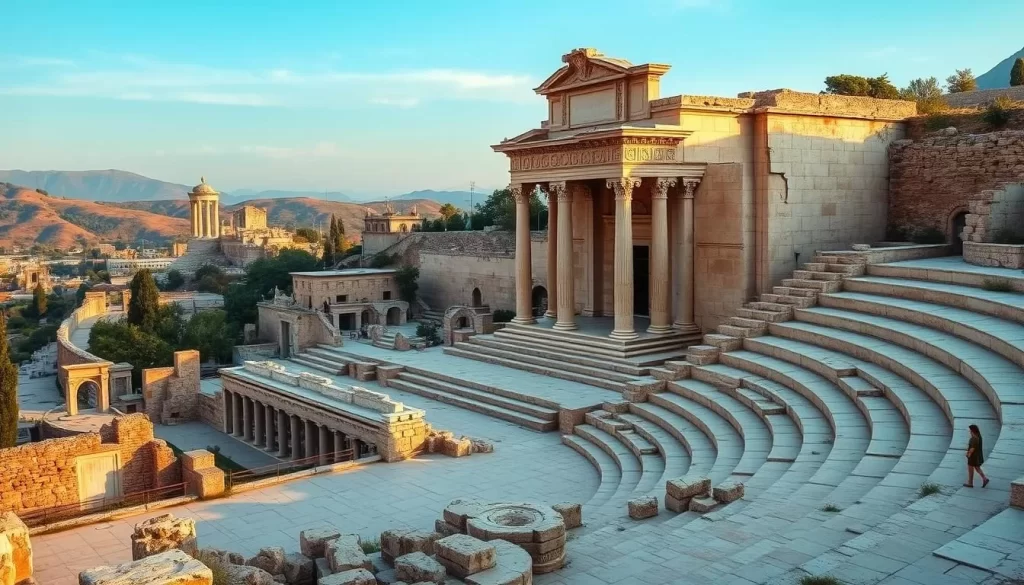
The story of Ephesus is one of resilience and transformation, reflecting the broader narrative of human civilization. As you explore the ruins, you’re not just walking through ancient streets; you’re tracing the footsteps of history.
Planning Your Visit to Ephesus
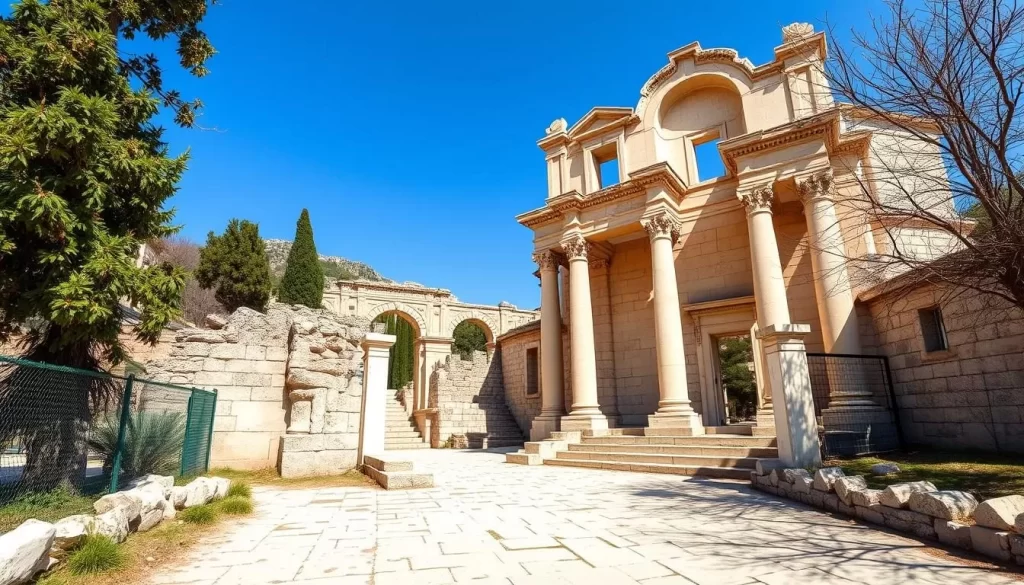
Before you head to Ephesus, it’s crucial to understand the best times to visit and how to navigate the site. Ephesus is a historical site that attracts a lot of visitors, and being prepared can make your visit more enjoyable.
Best Time to Visit Ephesus
The best time to visit Ephesus is early in the morning, right when it opens at 8:00 AM. This helps you avoid the crowds that arrive later with tour buses.
Visiting during the early hours of the day allows for a more peaceful and immersive experience among the ancient ruins.
Entrance Fees and Opening Hours
Ephesus is open 7 days a week from 8:00 AM to 11:00 PM. The entrance fee is 40€, which grants access to the Archaeological Site and the Efes Experience Museum. For an additional 12€, you can visit the Terrace Houses.
Make sure to check the official website for any updates on hours and fees before your visit.
How Long to Spend at Ephesus
You should allocate at least 2 to 4 hours to explore Ephesus properly. History enthusiasts might even want to dedicate a whole day to appreciate all the details.
Tips for Beating the Crowds
To avoid the people crowding the site, arrive by 7:50 AM to purchase your tickets and enter right at 8:00 AM. Alternatively, consider visiting during lunchtime when many tour groups take a break.
By planning your visit to Ephesus carefully, you can have a more enjoyable and less crowded experience at this significant archaeological site.
How to Get to Ephesus, Turkey
Traveling to Ephesus, Turkey, is easier than you think, with multiple transportation options available. You can reach this ancient city by flying, taking the train, or driving, depending on your starting location.
From Istanbul to Ephesus
If you’re traveling from Istanbul, the fastest way to reach Ephesus is by flying to Izmir Adnan Menderes Airport. With around 30 daily nonstop flights from Sabiha Gokcen International Airport, you can reach Izmir in about 1 hour and 15 minutes. From there, you can take a taxi or rent a car for the approximately 80 km journey to Ephesus, making it a convenient day trip.
From Izmir to Ephesus
For those already in Izmir, taking the train from Basmane Station to Selçuk is a cost-effective option. The journey takes about 1.5 hours and costs just under $3. With 8 daily departures, you can then catch a local bus or taxi to Ephesus. This tour option allows you to enjoy the scenic views along the way.
From Kusadasi to Ephesus
If you’re staying in Kusadasi, Ephesus is just a 25-minute drive away, making it an ideal day tour. You can rent a car or take a taxi for the short journey. Many tourists visit Ephesus as part of their cruise itinerary, and the convenient location makes it easy to explore this ancient site.

Regardless of your starting point, you have multiple travel options to reach Ephesus, ensuring that your journey is as enjoyable as your visit to this historical site.
Ephesus, Turkey: Best Things to Do – Top Picks
As you explore the ancient city of Ephesus, you’ll discover a wealth of historical treasures that will leave you in awe. Ephesus is a must-visit destination for history buffs and travelers alike, offering a unique glimpse into the lives of ancient civilizations.
Library of Celsus: Ephesus’ Iconic Facade
The Library of Celsus is one of the most recognizable landmarks in Ephesus, boasting a stunning two-story facade with four alcoves featuring statues that represent the virtues of Celsus. This ancient library once housed over 25,000 papyrus scrolls, making it a significant cultural and intellectual hub.

The Great Theatre: Ancient Entertainment Venue
The Great Theatre of Ephesus is an impressive structure that could accommodate up to 25,000 spectators. This ancient venue hosted various events, including drama productions and gladiatorial contests, showcasing the city’s rich cultural heritage.
Temple of Hadrian: Architectural Marvel
The Temple of Hadrian is a well-preserved structure dedicated to the Roman Emperor Hadrian. Its intricate details, including a prominent arch with a Medusa keystone and mythological reliefs, demonstrate the sophisticated architectural techniques of the 2nd century.
Curetes Street: Walking Through History
Walking down Curetes Street offers a unique opportunity to follow in the footsteps of ancient Romans. The marble-paved street is lined with columns that have stood for millennia, giving you a glimpse into the daily lives of Ephesus’ ancient inhabitants.
| Attraction | Description | Notable Features |
|---|---|---|
| Library of Celsus | Ancient library with a stunning facade | Four alcoves with statues, 25,000 papyrus scrolls |
| The Great Theatre | Massive entertainment venue | 25,000 spectator capacity, drama productions, gladiatorial contests |
| Temple of Hadrian | Well-preserved temple dedicated to Roman Emperor | Intricate details, Medusa keystone, mythological reliefs |
| Curetes Street | Marble-paved street lined with ancient columns | Historic significance, glimpse into daily life of ancient Ephesus |
These top attractions represent the pinnacle of Ephesus’ archaeological treasures and should be at the top of your must-see list when visiting this remarkable ancient city. By exploring these sites, you’ll gain a deeper understanding of the history and culture that once thrived in Ephesus.
Exploring the Terrace Houses of Ephesus
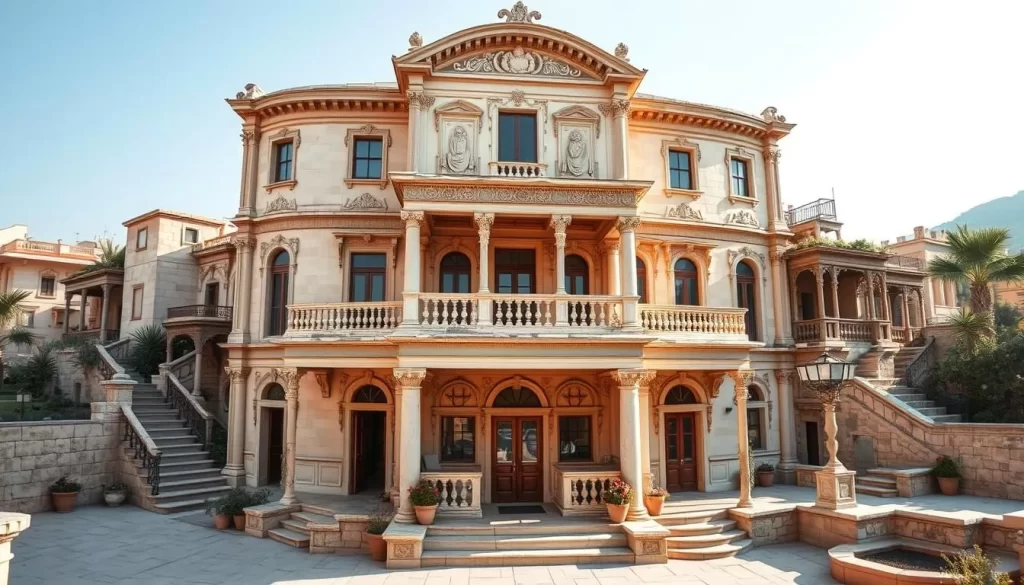
Step into the world of ancient Ephesus’ elite by visiting the remarkably preserved Terrace Houses. These luxurious residences, dating back to the Roman period, offer a unique glimpse into the lives of the city’s wealthy citizens. The Terrace Houses complex, unearthed in 1962, is now considered the jewel of the ancient city.
Luxury Homes of Ancient Ephesians
The Terrace Houses were the epitome of luxury in ancient Ephesus, reflecting the extravagant lives of the rich citizens. With heated marble floors, private water systems, and separate streets for the upper class, these multi-story residences showcased the opulent lifestyle of the elite. The complex even had exclusive boutiques underneath the houses, accessible to the wealthy housewives.
Mosaics and Frescoes: Artistic Treasures
The Terrace Houses are adorned with intricate mosaics and frescoes, displaying sophisticated artistic techniques and the refined taste of their wealthy owners. The ongoing excavation work by the Austrian Archaeological Institute continues to reveal new details about daily life in ancient Ephesus. As you explore the site, you’ll be amazed by the remarkably preserved structures and artistic treasures.
Visiting the Terrace Houses requires an additional €12 entrance fee, unless you have the Museum Pass Aegean. However, the intimate glimpse into ancient Roman domestic life makes it well worth the extra cost. As you complete your tour, don’t miss the latrines across the structure, a testament to the advanced amenities available to the wealthy.
Must-Visit Sites Near Ephesus
The area around Ephesus is rich in history, with numerous sites worth visiting. As you explore the ancient city, consider adding these nearby attractions to your itinerary for a more comprehensive experience.
House of the Virgin Mary: Sacred Pilgrimage Site
The House of the Virgin Mary, located atop Bülbül Mountain, is a significant pilgrimage site. According to tradition, Saint John the Evangelist brought the Virgin Mary to this house, where she spent her final years. The site has been visited by multiple popes and is revered by both Christians and Muslims.

Temple of Artemis: Wonder of the Ancient World
Just a short distance from Ephesus lies the Temple of Artemis, once one of the Seven Wonders of the Ancient World. Although only a single column remains today, it’s a testament to the grandeur of the original structure, which was 115 meters long and 46 meters wide with 127 columns.
Basilica of St. John: Christian Heritage
The Basilica of St. John in Selçuk town is another significant site, housing the tomb of St. John the Evangelist. The basilica offers spectacular views of the Ephesus plains and the Aegean Sea, providing insight into the historical landscape.
Selcuk Museum: Archaeological Treasures
To complete your historical journey, visit the Selçuk Museum, which showcases many artifacts excavated from Ephesus since the 1860s. The museum houses impressive marble statues of Artemis and other treasures, providing context to the ruins you’ve explored.
These sites near Ephesus offer a deeper understanding of the region’s rich history and cultural significance. By visiting these places, you can enrich your travel experience and gain a more nuanced appreciation of this ancient city and its surroundings.
Where to Stay When Visiting Ephesus
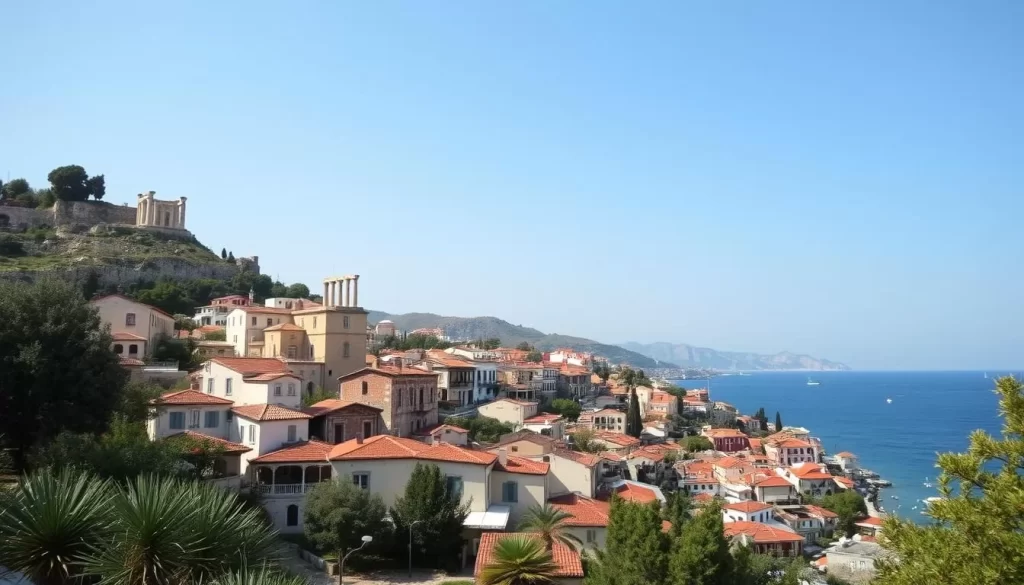
Selecting the perfect place to stay near Ephesus can enhance your travel experience, with options ranging from historical towns to coastal resorts. You have several excellent accommodation options when visiting Ephesus, each offering a different experience depending on your travel preferences and budget.
Staying in Selcuk: Closest to the Ruins
Staying in Selçuk puts you closest to the archaeological site (just 3 km away) and other attractions like the Basilica of St. John and the Temple of Artemis, making it ideal for history enthusiasts who want to maximize their sightseeing time. Having a rental car can give you more flexibility, but Selçuk’s proximity to Ephesus makes it a convenient choice even without one.
Sirince Village: Charming Boutique Experience
For a more atmospheric experience, consider Şirince Village, a charming former Greek settlement just 15 minutes uphill from Selçuk, where beautifully restored stone houses have been converted into boutique hotels surrounded by vineyards. You can enjoy wine tastings and local cuisine, making your stay as memorable as your visit to Ephesus.
Kusadasi: Coastal Resort Option
Kusadasi offers a coastal resort experience just 25 minutes from Ephesus, with numerous waterfront hotels, restaurants with sea views, and the opportunity to catch ferries to the Greek islands, perfect for those who want to combine beach time with historical exploration. You can finish your day watching the sun go down over the ocean with your loved ones and a cold beverage.
Dining and Local Experiences Around Ephesus

The Ephesus region is not just about history; it’s also a culinary journey waiting to be discovered. As you travel through this historic area, you’ll find delightful dining experiences that complement your explorations.
Traditional Turkish Cuisine in Selcuk
In Selçuk, be sure to visit Bizim Ev Restaurant, a family-run establishment on the way to Şirince Village. It serves authentic Aegean cuisine featuring fresh vegetables prepared with olive oil in the regional style. You’ll enjoy your meal in a serene setting, and make sure to end with traditional Turkish coffee and sweet treats like semolina halva.
Wine Tasting in Sirince Village
Şirince Village is renowned for its fruit wines, offering tasting opportunities as you wander its cobblestone streets. You can sample flavors ranging from apple and blackberry to more unusual varieties like mulberry and melon. After a day of touring, this is a great way to relax and experience the local culture.
Conclusion: Making the Most of Your Ephesus Adventure
As you conclude your journey through Ephesus, it’s clear that this ancient city is a treasure trove of historical significance. To make the most of your Ephesus adventure, consider arriving early and exploring the site methodically.
The Library of Celsus and Terrace Houses are must-visit attractions, offering a glimpse into the lives of ancient Ephesians. When planning your visit to Ephesus, remember to allocate sufficient time to explore the ruins and nearby attractions like the House of the Virgin Mary and Temple of Artemis.
Extending your stay in the region will enrich your understanding of this ancient city. Whether you’re on a day trip or a longer tour, the memories of walking through Ephesus’ ancient streets will stay with you. With its rich history and stunning architecture, Ephesus is an unforgettable experience.
The above is subject to change.
Check back often to TRAVEL.COM for the latest travel tips and deals.
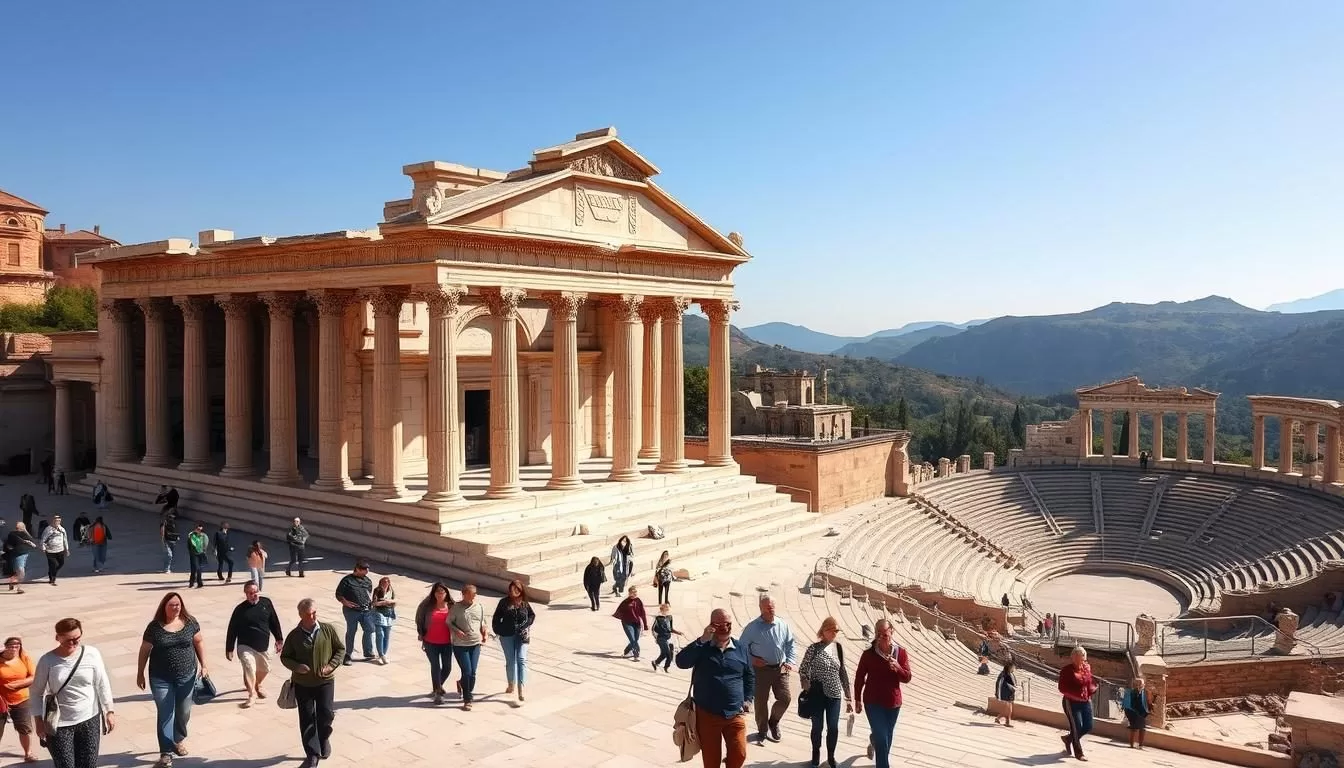





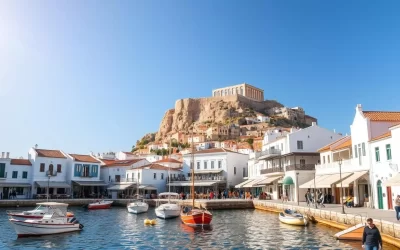
0 Comments